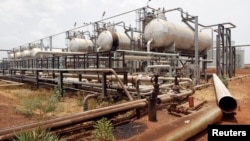The South Sudan government on Wednesday accused rebels loyal to former vice president Riek Machar of attacking an oil facility in Unity state and setting it on fire.
Information Minister Michael Makuei told reporters in Juba that rebel forces attacked the facility in Pariang County, in the north of Unity state, early in the week.
“This area is an area where the production of so many [oil wells] is pooled and then directed towards the processing center in Heglig," Makuei said.
"They set this place on fire. It was not operational, of course, since that area is under the rebels, but nevertheless they decided to set it on fire. And the fire was burning up to yesterday but we don’t know how far it has gone by now," he said.
'Not serious' about peace
Makuei noted that government and rebel officials agreed last week at talks in Khartoum, mediated by China, to protect foreign personnel and economic installations, including oil facilities. He said the rebel attack on the oil installation in Unity state was a clear violation of that agreement.
He said the rebels are not taking diplomatic initiatives to end South Sudan's conflict seriously.
“If the rebels were really genuine and serious in their talks, would there be any reason for them at this particular phase to destroy an oil installation?" he said. "The rebels are not serious. They don’t want peace; they want war.”
The rebels' military spokesman, Lul Ruai Koang, said the rebels were defending themselves after they came under attack from government forces.
"The government troops came to attack our forces with the intention of recapturing all the oilfields under our control, and in the process of opening fire on our forces they ended up destroying oil facilities," Koang said. "We came under heavy attack. We have the right to defend ourselves."
All but a small percentage of the oil fields in Unity state are under the control of the rebels, Koang claimed. He said the government has launched an offensive in the state to try to recapture those oil fields.
Oil is the backbone of South Sudan’s economy and most, if not all, of the crude the country produces is pumped in Unity and Upper Nile states. Those two states have borne the brunt of the 13-month-long South Sudan conflict.
Makuei warned the rebels against launching more attacks on oil facilities.
“These installations belong to all of us... the government of the Republic of South Sudan is under duty to defend and protect these properties,” he said.
Protecting oil
Makuei also accuses the United Nations Mission in South Sudan (UNMISS) of failing to protect South Sudanese civilians and the nation's oil facilities.
“One of the tasks of UNMISS is the protection of the civil population and the installations," he said. "There is no civil population being protected and there is no installation being protected, and, as such, we don’t know the task and mission of UNMISS in South Sudan."
Both government and opposition forces objected last year when the U.N. Security Council changed the focus of UNMISS's mandate from promoting development and nation-building to protecting civilians and ending the conflict.
The resolution passed by the Security Council in May, 2014, calls on UNMISS to "...deter violence against civilians, including foreign nationals in areas at high risk of conflict including schools, places of worship, hospitals and the oil installations, in particular when the Government of the Republic of South Sudan is unable or failing to provide such security."
U.N. officials have said repeatedly since then that the government should take the lead in protecting civilians and key infrastructure.
IGAD must act
Makuei also called on the regional Intergovernmental Authority on Development (IGAD) to take action against Machar's rebel group for violating the cessation of hostilities agreement brokered by IGAD and signed by both sides almost a year ago.
“The rebels have been violating the cessation of hostilities for that long," said Makuei. "We have been waiting to see what action will be taken by IGAD and by the protection force which is deployed here. But unfortunately nothing has come out from them."
"This time, we demand that IGAD must come out clearly on this issue. And it is our right to know what actions IGAD is taking,” he said.
IGAD and the United Nations have accused both sides in South Sudan’s conflict of violating the January 23, 2014 cessation of hostilities agreement.
Makuei said even though the rebels have repeatedly breached the IGAD-brokered deal to end the fighting, the government is committed to using peaceful means to try to end the conflict in South Sudan.









